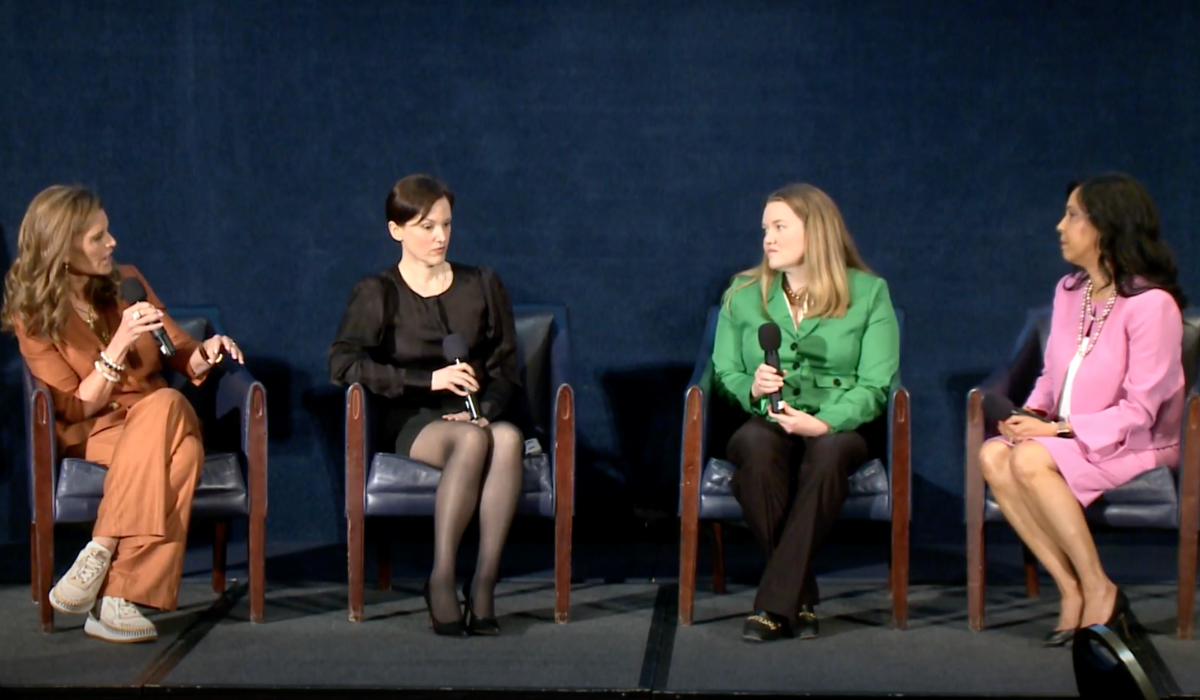Women are Sicker Than Ever. Maria Asked 3 Groundbreaking Researchers to Explain Why
The statistics are startling:
Two out of three people who develop Alzheimer’s are women, and women are twice as likely to develop Alzheimer’s as breast cancer. The news is even worse for women of color, who are at an even higher risk of developing Alzheimer’s than their white counterparts.
Women develop many diseases at a higher rate than men. Women are 90 percent of lupus patients, 80 percent of all autoimmune disease patients, 85 percent of migraine sufferers, twice as likely to have depression, and have a higher incidence rate of anxiety, multiple sclerosis, and asthma.
When I founded the Women's Alzheimer's Movement (WAM), I wanted to understand why women are at the epicenter of Alzheimer’s disease. Yet when I asked why women deal with cognitive decline in much higher numbers than men, I was met with, “Well we don’t know—but we also know very little about what happens to women in midlife.”
It is time this changed.
Women are sicker than ever, and nobody knows why that is. This is unacceptable, and it is up to us to do better. Bridging the gap that still exists between research in men (which we have loads of) and research in women (which is seriously lacking) is beneficial to all of us.
Which is why I sat down with three trailblazers in women’s health research: Janine Clayton, MD, director of the NIH Office of Research on Women’s Health; Jessica Caldwell, PhD, director of the Women’s Alzheimer’s Movement Prevention Center at Cleveland Clinic; and Lisa Mosconi, PhD, director of the Alzheimer’s Prevention Program at Weill Cornell Medicine/New York-Presbyterian Hospital.
I wanted to know: How do we bridge this gap?
Their answers convinced me that our future, hope, and power lie in research—and that we must bridge this gap.
A CONVERSATION WITH JANINE CLAYTON, MD, JESSICA CALDWELL, PHD, & LISA MOSCONI, PHD
MARIA: Janine, the statistics about women’s heath are startling and maddening. Why don’t we know why?
JANINE CLAYTON, MD: Women were not always included in NIH-supported clinical research, because we did not know how important it was to look at both women and men. So, from a historical perspective, we have many, many years of catching up to do. It wasn't until the NIH Revitalization Act in 1993 that women were required to be in the research. Why is that so important?
Well, if you're doing research on men and you're applying the findings to women, that's a problem. The great news is today, over half of the participants in NIH-supported research are women. But we have a lot of catching up to do.
MARIA: We hear a lot about moonshots for cancer or Alzheimer’s. I never hear about a moonshot for women’s health funding.
JANINE CLAYTON, MD: Last year, Congress asked us to look at NIH investments in women's health research, and we had a women's health conference that did just that. When we looked at our NIH research portfolio, we saw that chronic disease in women is under studied. We published a report that outlines those gaps, and these areas are indeed under study.
This year, Congress thought this was so important that they gave us an additional $10 million dollars to form an office of autoimmune disease research—80 percent of autoimmune disease patients are women, and there are about 300 autoimmune diseases. So that's one great step forward; to be able to address one particular area where the sex differences are really profound is a great step forward. Of course, we'd love to see more women's health research.
MARIA: Jessica, you run the women's Alzheimer's prevention center at the Cleveland Clinic in Las Vegas. What are you hearing from women who are taking part in your research?
JESSICA CALDWELL, PHD: What I hear from women almost unequivocally is that they are ready to make changes. They're aware that they're more at risk than men for Alzheimer's disease, and they are looking for tools that they can put into place at midlife.
Yet even in this population of women who are really motivated to make changes, women are sick. They have higher than expected rates of things like high blood pressure, diabetes, and pre-diabetes. What I'm taking home from all of this is that we have to do a better job of educating women that that all of these things are connected. Diabetes relates to Alzheimer's disease, high blood pressure relates to your brain health, what you do when you're 30 is really meaningful for what your life looks like at 65.
MARIA: Lisa, you are currently focused on researching the changes that happen in the brain during the menopause transition. What have you found to be most surprising or stunning in your lab lately?
LISA MOSCONI, PHD: My brain imaging research shows menopause has a very strong, very overlooked impact on brain health. In 2017, we did the first brain imaging study that looked at women's brains before and after menopause. It’s bizarre and offensive it took so long, but nonetheless, it was the first study to show that your brain energy levels take a dip as women go through the perimenopause transition, which may well explain the brain fog, memory lapses and many other symptoms of menopause.
Then we started looking at gray matter and found the gray matter was down during the transition to menopause and seems to plateau afterwards. Recently, we looked at Alzheimer's plaques, which really [increase] during the transition to menopause for some women. That was shocking to me. I think that was the most surprising thing. To be clear, these studies are looking at women with a family history of Alzheimer’s disease or who have genetic risk factors; we're not looking at women who do not have a family history or genetic risk factors.
MARIA: You’ve mentioned that even when you have these images and you go to other doctors or researchers, you get pushback. Why?
LISA MOSCONI, PHD: I think there's a concern that aging is what we're actually seeing there. Women go through menopause—but at the same time they are getting older. So there is a legitimate concern that maybe it's aging rather than menopause. We try to tackle that in many, many different ways.
OK, then let's look at men. Because if men of the same age are showing the same changes, then it's definitely aging and not menopause. But when we started enrolling men and looking at their brain imaging, we found a very clear difference between men’s brains and women's brains. Women's brains do not age the same way that men's age—and men's brains don't go through menopause, women's brains do.
What we're doing now is following people over time. So, we have the same person being their own control. We also started enrolling women based on age. Even when age is taken into account as best we can, there is still a very clear difference between women's and men’s brains.
MARIA: What question do you really want to answer with your research that you think will benefit women of all ethnic backgrounds and all ages?
LISA MOSCONI, PHD: I have so many questions. I want to look at estrogen in the brain, which strangely enough has never been done in humans. I would love to do a Hormone Therapy (HT) trial in women who are the right age—which is perimenopausal and very early postmenopausal women—where the outcomes are not incidence rates of Alzheimer’s disease 30 years later, but biological markers of the disease now. Thanks to the NIH, we are funded to start such a clinical trial.
Really, I want to see women's brain health become a more of a priority. I want to see more investigators also make it a priority. I think the main goal is to really make sure it's clear that reproductive health has an impact on brain health.
MARIA: What can every single person be doing today to perhaps increase their chances of preventing and/or delaying dementia?
JESSICA CALDWELL, PHD: That's a great question. There's so much people can do right now to reduce the risks of dementia.
The number one thing is exercise. This is going to have a direct impact on your brain in the short term and in the long term. It also will have indirect effects on other types of risk factors for dementia, like your heart health, your mood, and your stress levels.
If you've got exercise down, the next thing is make sure to prioritize your sleep. Sleep relates to so much. We consolidate memory during sleep. So even if we're not talking about a dementia risk, if you're not sleeping you will not remember as well as you will if you're sleeping enough. Not enough sleep also means you won't be giving your brain an optimal opportunity to clear proteins out that it doesn't need. One of those is amyloid—that protein that builds up in Alzheimer's disease.
The third thing I would say is put good food in your body. Eat nutritious food that's as least processed as you can. Lean more toward a Mediterranean-style diet, less toward processed foods.
MARIA: And it’s crucial we engage in community, right? Isolation is the death of all of us.
So, stay engaged, keep activating your brain, and join us as we try to bridge this research gap. It’s going to take all our brainpower to figure out how to build a movement that puts women at the center of research and puts women's health where it deserves to be.
To watch my interview with these three incredible women moving humanity forward, click here.
Please note that we may receive affiliate commissions from the sales of linked products.




